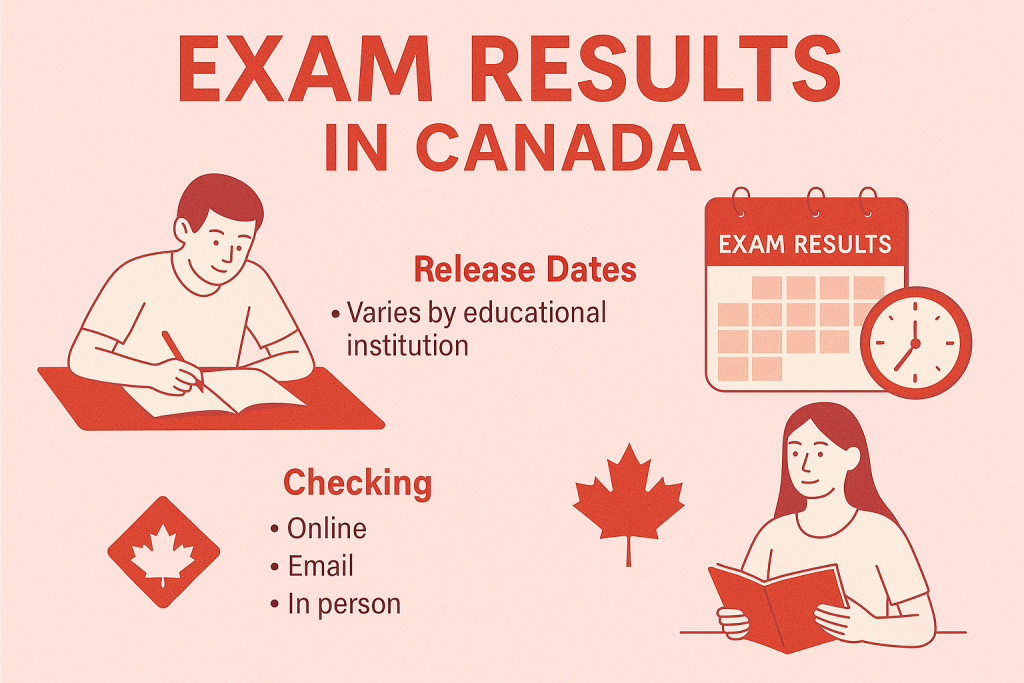Exams in Canada can look very different depending on where you live. Ontario focuses on the OSSD, provinces like BC and Alberta run provincial exams, Quebec follows the CEGEP system, and universities across the country rely on the GPA. Add in international tests like IELTS or TOEFL, and Canadian students face results that often shape the next steps in life. Let’s go through when results are announced in Canada, how students check them, how to handle the stress, and why the Canadian exam system is uniquely flexible.

🗓️ When Results Are Announced
- High School:
- Ontario OSSD → results in late June.
- BC & Alberta provincial exams → results in July.
- Quebec CEGEP → grades and R-Scores in early summer.
- University Grades:
- Fall (Sept–Dec) → results released in Dec/Jan.
- Winter (Jan–Apr) → results released in May.
- Summer (May–Aug) → results released in August.
- International Exams:
- IELTS → 13 days.
- PTE → 2–5 days.
- TOEFL → about 1 week.
- GRE, MCAT, LSAT → 3–5 weeks depending on the exam.
🔎 How Students Check Results
- School and university portals: The main way students access their marks.
- OUAC (Ontario): Used for high school students applying to universities.
- Emails or letters: Many institutions still send official notifications.
- Printed report cards: Still common in high schools.
- Exam websites: IELTS, TOEFL, GRE, and others provide online portals.
😰 What to Do If Fear or Anxiety Comes
Results day stress is real, but it can be managed:
- Stay active: Hockey, gym, or outdoor walks help clear the mind.
- Talk to others: Friends and family are often waiting for results too.
- Have a backup plan: Colleges, bridging programs, and apprenticeships exist if results aren’t ideal.
- Limit comparisons: Everyone’s timeline is different – don’t measure yourself against others.
💡 Motivation Tips
- Celebrate effort: Preparing for exams itself is a big achievement.
- Visualize success: Imagine checking your results calmly and confidently.
- Set new short-term goals: Use results as a starting point, not the end.
- Stay flexible: Canada’s education pathways ensure no single exam decides your future.
📘 Best Books and Resources
- High School: Nelson Education study guides, Pearson resources, provincial past exams.
- University: Exam banks, lecture notes, library e-resources.
- International Exams:
- IELTS → Cambridge IELTS books.
- TOEFL → Kaplan and Princeton Review.
- GRE/MCAT/LSAT → Manhattan Prep, Kaplan, Princeton Review.
🌏 Why Canada’s Exam System is Unique
- Provincial variety: Different provinces offer different systems, giving flexibility.
- Pathway diversity: Universities, colleges, and apprenticeships are all valued.
- Holistic admissions: Grades matter, but so do extracurriculars and essays.
- Balance of life and study: Sports, arts, and cultural involvement are part of learning.
📝 Final Words
Exam results in Canada are important, but they’re not the whole story. Whether you’re waiting on your OSSD, GPA, or IELTS score, remember:
- Results measure performance, not your potential.
- Canada’s education system ensures multiple opportunities.
- Persistence and resilience matter more than perfection.
So when results are announced, check them with calm confidence. Whatever the outcome, Canada guarantees you still have paths open ahead.